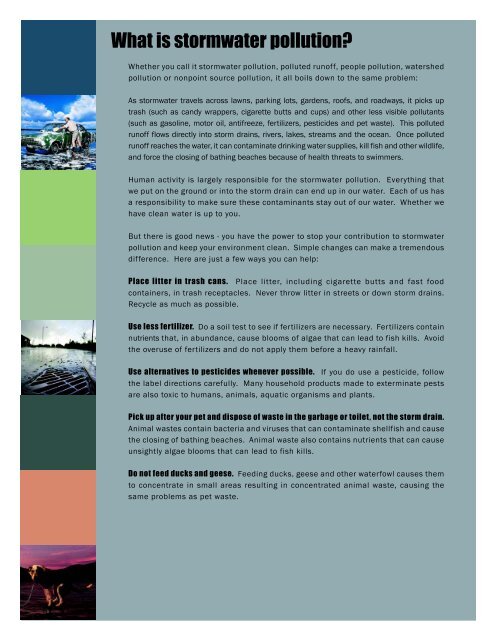what is stormwater?
what is stormwater?
what is stormwater?
Create successful ePaper yourself
Turn your PDF publications into a flip-book with our unique Google optimized e-Paper software.
What <strong>is</strong> <strong>stormwater</strong> pollution?<br />
Whether you call it <strong>stormwater</strong> pollution, polluted runoff, people pollution, watershed<br />
pollution or nonpoint source pollution, it all boils down to the same problem:<br />
As <strong>stormwater</strong> travels across lawns, parking lots, gardens, roofs, and roadways, it picks up<br />
trash (such as candy wrappers, cigarette butts and cups) and other less v<strong>is</strong>ible pollutants<br />
(such as gasoline, motor oil, antifreeze, fertilizers, pesticides and pet waste). Th<strong>is</strong> polluted<br />
runoff flows directly into storm drains, rivers, lakes, streams and the ocean. Once polluted<br />
runoff reaches the water, it can contaminate drinking water supplies, kill f<strong>is</strong>h and other wildlife,<br />
and force the closing of bathing beaches because of health threats to swimmers.<br />
Human activity <strong>is</strong> largely responsible for the <strong>stormwater</strong> pollution. Everything that<br />
we put on the ground or into the storm drain can end up in our water. Each of us has<br />
a responsibility to make sure these contaminants stay out of our water. Whether we<br />
have clean water <strong>is</strong> up to you.<br />
But there <strong>is</strong> good news - you have the power to stop your contribution to <strong>stormwater</strong><br />
pollution and keep your environment clean. Simple changes can make a tremendous<br />
difference. Here are just a few ways you can help:<br />
Place litter in trash cans. Place litter, including cigarette butts and fast food<br />
containers, in trash receptacles. Never throw litter in streets or down storm drains.<br />
Recycle as much as possible.<br />
Use less fertilizer. Do a soil test to see if fertilizers are necessary. Fertilizers contain<br />
nutrients that, in abundance, cause blooms of algae that can lead to f<strong>is</strong>h kills. Avoid<br />
the overuse of fertilizers and do not apply them before a heavy rainfall.<br />
Use alternatives to pesticides whenever possible. If you do use a pesticide, follow<br />
the label directions carefully. Many household products made to exterminate pests<br />
are also toxic to humans, animals, aquatic organ<strong>is</strong>ms and plants.<br />
Pick up after your pet and d<strong>is</strong>pose of waste in the garbage or toilet, not the storm drain.<br />
Animal wastes contain bacteria and viruses that can contaminate shellf<strong>is</strong>h and cause<br />
the closing of bathing beaches. Animal waste also contains nutrients that can cause<br />
unsightly algae blooms that can lead to f<strong>is</strong>h kills.<br />
Do not feed ducks and geese. Feeding ducks, geese and other waterfowl causes them<br />
to concentrate in small areas resulting in concentrated animal waste, causing the<br />
same problems as pet waste.


